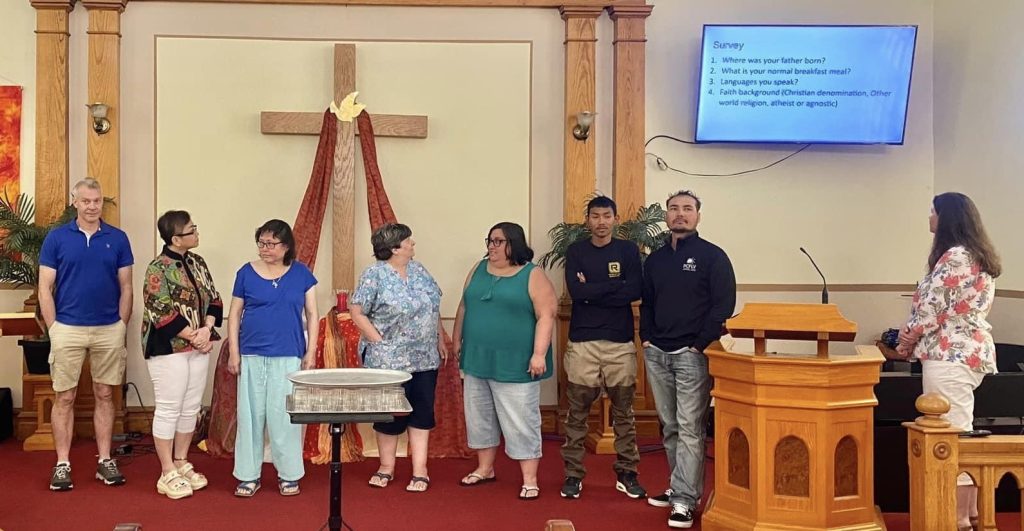by Rose Bender Cook
Based on a sermon preached at Whitehall (PA) Mennonite on 16 June 2024 from Ephesians 4:1-6.
Since Pentecost, I have been thinking a lot about the Holy Spirit (#MosaicTogether2024). Mosaic’s strategic plan calls for a common definition of what it means to be Spirit-led. Recently, I have been led to consider how it is the work of the Spirit to bring unity.
1 Cor 12:13 says, “For we were all baptized by one Spirit to form one body.” (NIV) The implication is that it’s not my job as a pastor or a Mosaic staff member to bring unity to the church.
And yet I long for unity. Or at the very least, a deep respect and appreciation for one another that allows us to live and minister together in the body of Christ.
Recently, I invited eight members of the Whitehall congregation to answer questions that would reveal some of our differences: where was your father born? How many languages do you speak? What do you eat for breakfast? I wanted to show how different we are, and that by the power of the Spirit, we have been placed into one congregation– baptized into one large Body of Christ. As it happened, the answers were so different – including the breakfast foods. Only one of these persons was raised Mennonite.
In his book, Humility Illuminated, Dennis Edwards reminds his readers of the Pauline teaching that the position or current location of believers is in Christ. It’s not our geography, language, or even our theology that should unite us. Rather, it is our position in the body of Christ. That is where the Spirit puts us and that is what makes unity possible.
Paul reminds the first century Christians in Ephesus that Jesus broke down the dividing wall and created one new humanity. So that, whether they are Jew or Gentile, slave or free, male or female, circumcised or uncircumcised, barbarian or Scythian—they are now one in Christ.
Of course, we have our own categories of US and THEM—whether its theology, language, practices we consider faithful or unfaithful, worship styles, economic or education levels, what country we were born in, or what last names we have.
I wonder if Paul were writing a letter to Mosaic Conference—what categories would he have included? “In Christ there is no longer _____ or _____. “
Though it is the work of the Spirit to unite us, we have a role to play too. Ephesians 4:3 says, “Make every effort (as far as it depends on you) to keep the unity of the Spirit through the bond of peace.”
How do we keep the unity of the Spirit? In verse 2 Paul tells us to be completely humble, gentle, patient, and bearing with one another in love.
Humility, gentleness, patience, and love that invites me to bear with my siblings in Christ—these are the qualities I need to cultivate.
I am being convicted that I am not the gatekeeper of the church or the one who needs to create unity. That is the work of the Spirit. I have plenty to do in examining the posture of my own heart and seek to keep the unity the Spirit has already established.
As a response, my prayer this summer has been something like this:
Spirit, soften my heart—may it be gentle and humble like Jesus’
Grant me patience to see others as you see them,
To wait upon your timing
To trust in your transforming work in my own life and in the lives of others.
And help me swim in the ocean of your abundant and gracious love.
For your kingdom and your glory.
In Jesus name. Amen.
May it be so.


Rose Bender Cook
Rose Bender Cook is the Leadership Minister for Formation and the Mosaic Institute Director. She is also a pastor at Whitehall (PA) Mennonite Church.
The opinions expressed in articles posted on Mosaic’s website are those of the author and may not reflect the official policy of Mosaic Conference. Mosaic is a large conference, crossing ethnicities, geographies, generations, theologies, and politics. Each person can only speak for themselves; no one can represent “the conference.” May God give us the grace to hear what the Spirit is speaking to us through people with whom we disagree and the humility and courage to love one another even when those disagreements can’t be bridged.
